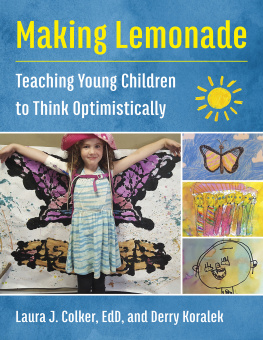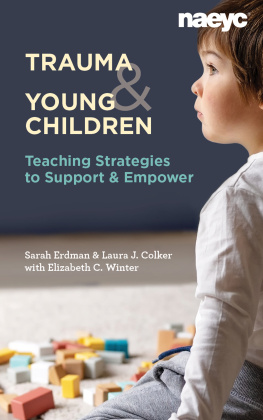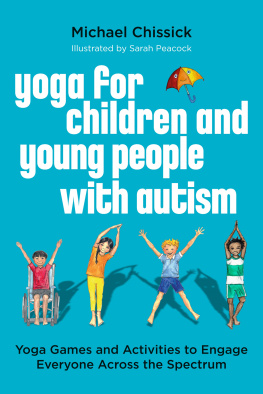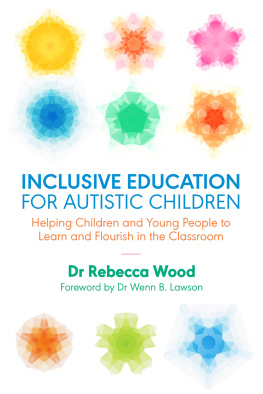
Making Lemonade | 
|
Teaching Young Children to Think Optimistically
Laura J. Colker, EdD, and Derry Koralek

| Readleaf Press www.redleafpress.org 800-423-8309 |
Published by Redleaf Press
10 Yorkton Court
St. Paul, MN 55117
www.redleafpress.org
2019 by Laura J. Colker and Derry Koralek
All rights reserved. Unless otherwise noted on a specific page, no portion of this publication may be reproduced or transmitted in any form or by any means, electronic or mechanical, including photocopying, recording, or capturing on any information storage and retrieval system, without permission in writing from the publisher, except by a reviewer, who may quote brief passages in a critical article or review to be printed in a magazine or newspaper, or electronically transmitted on radio, television, or the internet.
First edition 2019
Senior editor: Heidi Hogg
Managing editor: Douglas Schmitz
Cover design: Mayfly Design
Cover art: created by children at Eastern Ridge School, Great Falls, Virginia; photographed by Julie A. Liddle, atelierista and program director
Interior design: Mayfly Design
Typeset in Arno Pro
Interior photos by Peggy DeLanghe, Elizabeth Keller, Jessica Humphries, and Julie A. Liddle
Printed in the United States of America
Library of Congress Cataloging-in-Publication Data
Names: Colker, Laura J. (Laura Jean), author. | Koralek, Derry Gosselin, author.
Title: Making lemonade : teaching young children to think optimistically / Laura J. Colker, EdD, and Derry Koralek.
Description: First edition. | St. Paul, MN : Redleaf Press, 2019. | Includes bibliographical references.
Identifiers: LCCN 2018048157 | ISBN 9781605546612 (pbk. : alk. paper)
Subjects: LCSH: Optimism in children. | Educational psychology. | School childrenAttitudes. | Learning, Psychology of.
Classification: LCC BF723.O67 C65 2019 | DDC 649/.64dc23
LC record available at https://urldefense.proofpoint.com/v2/url?u=https-3A__lccn.loc.gov_2018048157&d=DwIFAg&c=euGZstcaTDllvimEN8b7jXrwqOf-v5A_CdpgnVfiiMM&r=rvV70tfAjXVbLdq1QdXNwJ7yH2gL-mOyODQS4d3gIYk&m=FQ-mUBXPGU54OPfXqwvuAxRtUalCupvhGVGKQXTTBU8&s=9Fu1sqAJe7CMhs6vsucm8nvK_k_8Rpt07vxY3T7cVPE&e=
To Doug, whose love and support would make anyone optimistic.
LJC
To Craig, my essential partner on the road to optimistic thinking.
DK
Contents
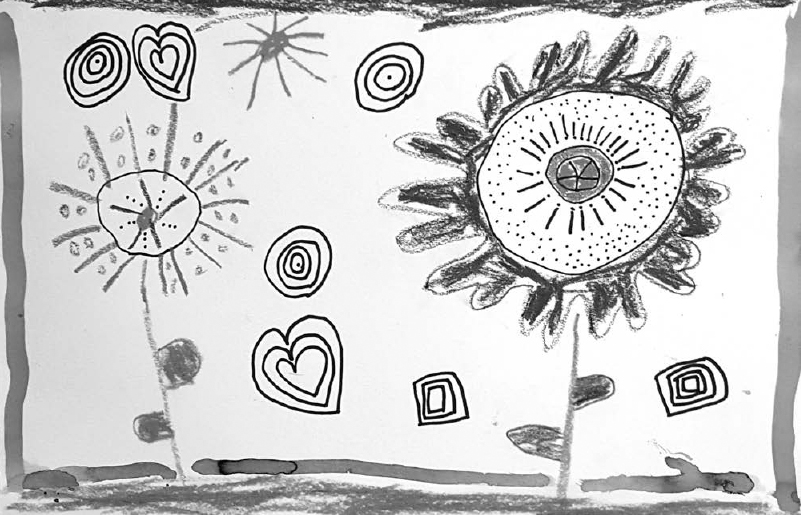
Foreword
T he mission of the Life is Good Kids Foundation is to spread the power of optimism to kids who need it mostthose whose lives have been deeply impacted by poverty, violence, and severe illness. We work toward this mission by supporting the people who dedicate their careers to building healing, life-changing relationships with the children in their care. We call these frontline child care professionals playmakers. In sports, playmakers make good things happen when the game is on the line and their team needs them most. We use playmakers to describe people whoat a pivotal time in a childs lifemake a positive, powerful, and lasting difference. In other words, playmakers in sports help to change the outcome of games. Playmakers in child care help to change the outcome of lives.
As playmakers, we believe that optimism is the single most important trait that a child can have in order to lead a good life. Playmakers work hard to ensure that nothing destroys the optimism of children. Nothing.
But if you ask others what they believe to be the single most important trait that a child needs to lead a good, healthy life, optimism is not at the top of most peoples list. I know this to be true because Ive had the privilege and pleasure of posing this question to thousands of child care professionals from across the country and around the world. Traits like love, courage, compassion, and gratitude typically top the list. Is optimism really more important than love? Or compassion? Or courage? Or gratitude?
At the Life is Good Kids Foundation, we define optimism as a persons capacity to see and focus on the goodness in themselves, the goodness of others and in the goodness in the world around them. By this definition, optimism is a prerequisite for love, compassion, courage, and gratitude. Without the capacity to see and focus on the goodness in others, how can a person consistently act with love and compassion? Without the capacity to see and focus on the goodness in ones self, how can a person consistently act with courage? And without the capacity to see and focus on the goodness in the world, how can a person act with gratitude? Every positive, prosocial human trait is rooted in optimism.
Engineer Donald P. Conduto once said, The most important thing is to keep the most important thing the most important thing. Optimismin my experienceis the most important thing. The problem is that in times when we most need optimism, it is most difficult to come by. When were feeling good and life is going our way, optimismas an emotional stateis easy to muster. However, when things fall apart and life gets overwhelmingly difficult, optimism can dry up faster than a drop of water on desert sand. If we want optimism to be accessible to children even in lifes darkest hours, we must help them develop optimism as a character trait and not just as a state of mind. Optimism as a state of mind is fleeting. Optimism as a character trait is lasting, and it requires three thingspractice, practice, practice.
I am so grateful that Laura and Derry have written this book, and I am equally grateful to you for choosing to read it. This bookin addition to comprehensively exploring the topic of optimismprovides readers with very simple yet powerful activities designed to help nurture optimism in children so that it is available to them to whenever they need it. And as theologian E. Stanley Jones once said, It is easier to act yourself into a new way of thinking than to think yourself into a new way of acting. If we as care providers are able to live life optimistically, we will be much better positioned to help the children in our care do the same.
Thank you for your interest in the wellbeing of children and for being intentional about building the type of relationships and environments that allow the seeds of optimism to take root and flourish. I cant think of a more important endeavor. For only when children feel safe, loved, joyful, and engaged in the present moment will they be able to truly see the goodness in themselves, others, and the world around them.
In closing, I would like to leave you with one final Life is Good pearl of wisdom: Theres no use being pessimistic. It wouldnt work anyway. ;)
Steve Gross
CEO and Chief Playmaker, Life is Good Kids Foundation
Acknowledgments
T his book has been a long-time passion for us. As with most things of value, it came together with help from many caring and talented people.
At the heart of the book are optimism-related activities that were field-tested by a number of dedicated early childhood teachers. Their feedback allowed us to refine the activities and ensure they support teaching and learning optimism. We acknowledge and thank the following educators for their invaluable contributions:
Next page
